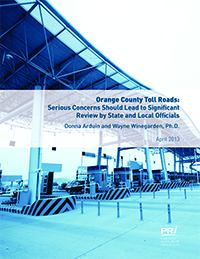New Analysis of Orange County Toll Roads Reveals Unsustainable Debt Levels, Cost Overruns, Financial Mismanagement, and an est. $1.7 Billion in Taxpayer Subsidies
Proposed refinancing plans will add hundreds of millions in debt without addressing fundamental issues, former California Finance Director Donna Arduin finds
The Pacific Research Institute released a study on the 241 and 73 toll roads operating in Southern California titled: Orange County Toll Roads: Serious Concerns Should Lead to Significant Review by State and Local Officials, authored by Donna Arduin, former budget director for California Governor Arnold Schwarzenegger and Wayne Winegarden, Ph.D. and PRI senior fellow.
The 241 and 73 toll roads are managed respectively by the Foothill/Eastern Transportation Corridor Agency (FETCA) and the San Joaquin Hills Transportation Corridor Agency (SJHTCA)jointly known as the Transportation Corridor Agencies (TCA).
Based on my review, the operations of these toll roads presently appear to be unsustainable and may have been unworkable from their inception, Ms. Arduin said. [S]ubsequent decisions by TCA board members and managers have made matters worse. Ms. Arduins study shows:
- Unlike virtually every other toll road in the United States, the Orange County toll roads receive annual subsidies from taxpayers for road maintenance. These subsidies — which include payments by homeowners via developer fees — total an estimated $1.7 billion to date.
- A substantial portion of the current debt is in the form of controversial capital appreciation bonds, which defer both principal and interest payments for an extended period of time. This structure permitted TCA to have much smaller debt service payment in the early years but will result in huge increases in annual debt service payments each year through maturity. For both FETCA and SJHTCA, capital appreciation bonds constitute 23 percent of total outstanding debt.
- In order to meet the toll roads debt obligations, toll rates have risen dramatically; the debt per mile for the 241 toll road (managed by FETCA) is $64 million and for the 73 toll road (SJHTCA) is $136 million, compared to $17.1 million for the average U.S. toll road.
- Toll rates for the 241 and 73 roads are among the highest in the country. This has compelled price-sensitive commuters to avoid them and instead to drive on free public roads.
TCAs proposal to refinance the debt by extending the repayment period has the effect of exacerbating the problemnot managing it, Ms. Arduin said. The proposed refinancing would add $1 billion to TCAs current debt obligation, bringing the total to $11 billion.
Ms. Arduin added that the proposed refinancing plan would postpone indefinitely the date on which use of the roads would be toll-free to the public, as originally promised, because the cost of the refinance will require the tolls to continue indefinitely. She also noted that the bureaucracy at TCA benefits from the refinancing terms as well: This agency would only sunset once the bonds are paid off; extending the terms of debt repayment keeps this bureaucracy intact.
Recommendations
Ms. Arduins report includes several recommendations, including:
- TCAs proposed refinancing plan is extremely risky and relies heavily on capital appreciation bonds. The proposed refinancing plan should not proceed without further review by state officials.
- TCAs plan to spend funds to extend the 241 under these conditions is not justifiable and should cease immediately.
- The board and management of FETCA and SJHTCA should address these serious shortcomings and evaluate additional options before continuing plans to extend the 241 or refinance existing debt.
- Caltrans should review its subsidy of toll road maintenance, should suspend any agreement that prevents improvements to Interstate 5, and should undertake a comprehensive review to coordinate traffic for the county in a rational, efficient manner.
Ms. Arduin concludes: Given the demonstrated inability of the FETCA and SJHTCA boards to manage risk, the state or another third party should review the finances and operations of the toll roads and evaluate alternative governance structures and transportation plans.
To arrange an interview with Donna Arduin, please contact Rowena Itchon at [email protected] or at 415-955-6123.


